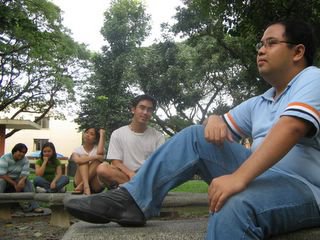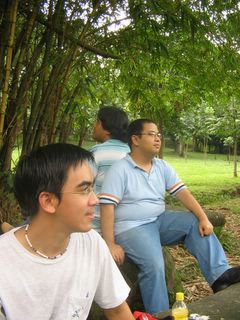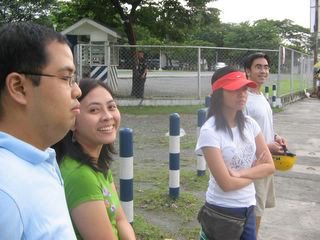I am posting this article which I got from Ambeth Ocampo's column in the Philippine Daily Inquirer. The article talks about how we should re-view our shared past with Spain in order to find and liberate ourselves.
'Signs of identity'
By Ambeth Ocampo
MADRID-- A two-day Spanish-Philippine "Tribune" opens in the Spanish capital this morning. Organized by Casa Asia, the forum brings together representatives from government, business, academe and civil society from both countries to discuss ways by which we can renew and perhaps reinvent the long historical ties between the Philippines and Spain. Invited to participate in a session on "Signs of Identity; culture and mutual perception," I prepared these thoughts for discussion:
Perhaps it is coincidence that the Tribune opened on Nov. 30, the Feast of San Andres, Patron of the Distinguished and Ever Loyal City of Manila. Nov. 30 is a national holiday in the Philippines, held in honor not only of the apostle but also of his namesake, Andres Bonifacio, who ignited the Philippine Revolution against Spain in 1896. It is in memory of him and our shared history that we make the following remarks on the theme "señas de identitad" [signs of identity] so that we may come to an understanding of how these signs are (mis)read in the reckoning of our shared history.
Whether we like it or not, modern Philippines is a part of Spain. In the same reciprocal way, Spain is a part of the Philippines, not in the political or economic sense, but rather in the more important and binding realm of culture. Our countries are linked, through a shared history, a shared culture, elements of a shared language, but how our relationship is perceived largely depends on the way our shared history developed, how it is transmitted, and more importantly how it is understood.
There are many visible and invisible signs of the Spanish legacy in the Philippines : in language, in the heavily Spanish rather than Roman Catholic faith, elements in our food, the visual arts, music, literature, etc. To dwell on all these, even briefly, will take more than the 20 minutes allotted for our presentation, so our discussion will be on our shared culture-points of convergence, and sometimes points of confusion.
We begin our exploration with a chocolate covered cookie available in Spain called "Filipinos." There is a similar, but larger, item available in the famous Manila pasteleria La Dulcinea where, for obvious reasons, it could not be called "Filipinos" and was christened "Negritos." In time, the pasteleria probably felt this was racist, so its name was changed to "Moritos" which is worse than racist as it is politically incorrect. How simple life would be if we stuck to the original name "Filipinos," but this is not possible in Manila where oversensitive souls will complain.
In colloquial Filipino, the word for going out for a walk is "pasyal," obviously from the Spanish verb "pasear." But what is more intriguing is that there is another term for "pasyal" and it is, pardon the expression, "lamierda." Spelled as one word and used as a verb, Filipinos will invite you for a walk with "Mag-lamierda tayo" instead of "Vamos a pasear." (Art's Note: mierda means "shit" in Spanish. In Filipino, "tae")
Filipinos know lamierda is a Spanish word, but are clueless as to its literal meaning, such much so that when made aware they blush with shock and embarrassment. How did this vulgar Spanish term gain new meaning when it was transplanted to a new land and a new culture? That is a question we leave for the philologists and linguists.
Another example of the (mis)reading of Spanish in the Philippinesconcerns names, surnames and place names of Spanish origin. While these are tangible proof of the Spanish presence in the past, we draw your attention to one of Manila's senior and best-known fashion designers Jose Moreno. He is more popularly known by his nickname "Pitoy" and his social and professional name "Pitoy Moreno" is a byword in Philippine fashion. Pitoy Moreno can be declared casually and without malice in Manila, but here in Madrid, we have to mind our language for it pertains to something else. (Art's Note: Pitoy Moreno literally means 'dark/ brown penis')
The amusing examples above illustrate how Spain and Spanish are remembered in the Philippines today, and how language is often the source for mixed signals. Our history is no different, and it is here that our countries, our people, our cultures can meet but unfortunately do not. It is in our history that we will find ourselves. History should liberate but sometimes it tends to imprison people in the past or in old paradigms.
No book or university course on Philippine history can cover all the events from 1565, when Miguel Lopez de Legazpi set foot on our shores and claimed the land for the Crown of Spain, till 1898 when, as a result of the Spanish-American War, the ancient walled city of Intramuros was surrendered to the United States of America, and with it fell the Spanish Philippines. Three centuries of history is a large terrain, so it is broken into periods, with attention focused on the last quarter of the 19th century where the Philippine Revolution becomes the fulcrum of modern Philippine history or the emergence of the Philippines as a nation. Because Philippine history is reckoned in this way, the result is that Spain is often painted as an enemy, as an oppressor, who did no good at all in the 333 years of shared history. Oversimplified Philippine history often obscures all the other influences in culture that remain so assimilated into Philippine life they are nearly invisible.
THE PHILIPPINESand the Filipinos are separated from their Hispanic past because of language. We know that there is so much material in libraries and archives both in the Philippines and Spain available and yet inaccessible to most interested Filipinos because of language. Ferdinand Marcos even issued a decree recognizing Spanish as an official language of the Philippines until such time that all our historical records are translated from the original Spanish and made available to the people in English, Filipino and other major Philippine languages.
Most foreigners wonder why Filipinos do not speak or understand Spanish despite three centuries under Spain. One reason may be that the Philippines being an archipelago with over 7,000 islands and peopled by different ethno-linguistic groups, it was deemed easier for Spanish friars and government officials to learn local languages than teach Filipinos one common language (which the Americans did quite successfully in half a century). That the Filipinos did not learn the language that would have united them can be seen from figures presented by Dr. Alma Ocampo-Salvador of the Ateneo de Manila University: In 1898 [the end of Spanish rule], there were 757,463 Filipinos who could speak Spanish. In 1939, the number declined to 417,375, and by 1948, the number dwindled further to 345,111. In 1990, only 2,662 people spoke Spanish. We do not have the figures for 2005, but we would like to believe that the lucrative jobs for Spanish speakers in call centers in the Philippines have encouraged a significant increase because Spanish-speaking staff are better paid than their colleagues who only mastered English. The United Statesimplanted not only English in the Philippines , but with it, a view of history that depicted Americans as liberators and benevolent assimilators. While Filipino schoolchildren can talk of the cruelty of Spain, the execution of our heroes, etc., they do not know about the horrors of the Filipino-American War or how the United States abandoned the Philippines during World War II and allowed the country and people to be crushed in order to delay the Japanese march across the Pacific. One could say that this lopsided view of history is the fault of historians with a pro-American bias but, in retrospect, one of the reasons for this state of affairs is that language alienated Filipinos from their past.
Most people associate the word "pre-historic" with dinosaurs and cave men, when the term should rightly be seen as the period before written or recorded history. There was a time when the recorded history of the Philippines began with Ferdinand Magellan and his "discovery" of the Philippines in 1521. Actually, the archipelago had no name or at least had one that has since been forgotten. Magellan christened the islands "Archipelago de San Lazaro," and it was Villalobos who, later in 1543, gave the islands the present name "Felipenas" after Philip II of Spain. Thus, we are a country and people named after a 16th-century Spanish monarch. What we were called before becoming Filipinos is now lost to history.
It is important to see the reaction to the above viewpoint as expressed by Gregorio Zaide, who argued for a reevaluation of Philippine history and an interpretation based not on a Spanish but on a Filipino viewpoint. How could Magellan have discovered the Philippines , he asked, when there were people living there already? Surely they had a name, a culture, some form of identity, but where did all that go? Zaide encouraged a reading of history from the Filipino viewpoint: Magellan did not discover the Philippines, he "rediscovered" the Philippines.
And so it remained but for an opposing view from another historian, Teodoro Agoncillo, who stated that Zaide's line of thinking was, despite its good intentions, at best misleading and inaccurate. To prove his point, Agoncillo asked how Magellan "rediscovered" the Philippines . Was Zaide saying that the archipelago disappeared, or hid underwater for a while, only to resurface again for Magellan to rediscover it? It has been two decades since we discussed this historiographical issue with Agoncillo, and we would like to believe that since then, we have matured in the practice and interpretation of history. For when we write our own version of the general history of the Philippines , we will not say that Magellan "discovered" the Philippines in 1521, for that is the Spanish view of that event. We will not even say Magellan "rediscovered" the Philippines, for the Zaide line is a rabid nationalist interpretation of that same event. We will simply state that Magellan arrived in the Philippines in 1521. That is the modern Filipino viewpoint.
As you can see, the story has not changed, the characters are the same and so is the date. But as you can also see, one simple word -- from "discovered" to "rediscovered" to "arrived" -- colors the whole way in which the story is understood. How do we rediscover, rewrite and reevaluate our tired past if we do not have the Spanish sources as keys to a new way of seeing that past? Only with a full grasp of the material can one come to terms with our shared past and be liberated, rather than imprisoned, by history.













